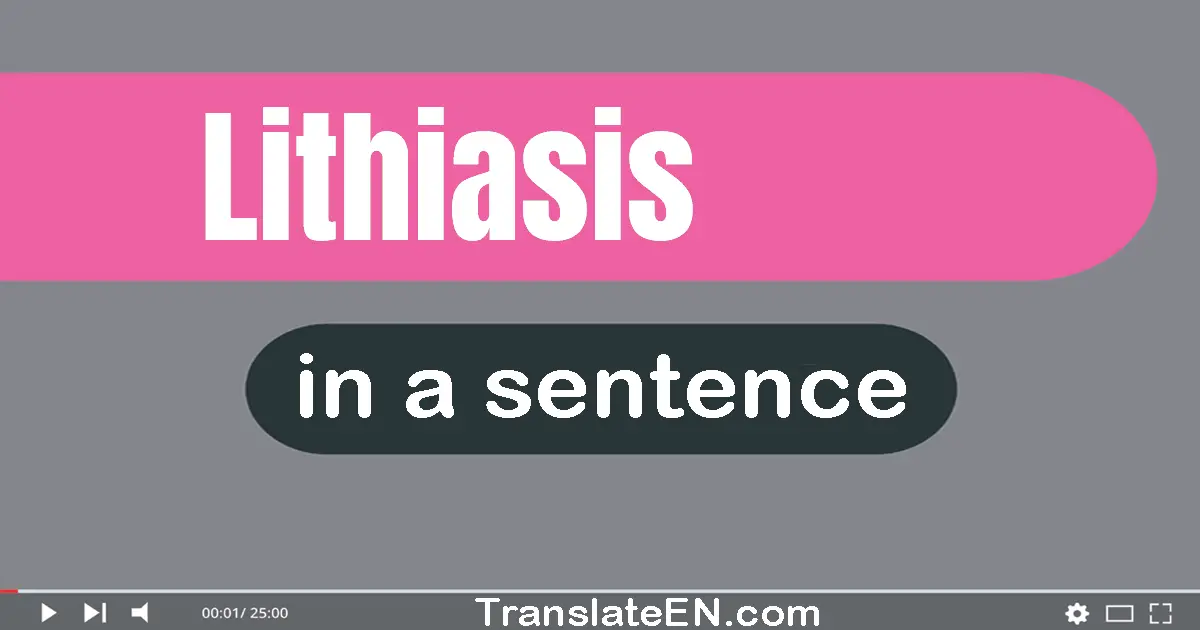Lithiasis in a sentence
Synonym: calculus.
Meaning: The formation of stones or calculi in the body, particularly in organs.

(1) The most common type of lithiasis is kidney stones.
(2) The symptoms of lithiasis include severe pain, nausea, and vomiting.
(3) Treatment for lithiasis may involve medication, surgery, or lithotripsy.
(4) Lithiasis can also occur in the gallbladder, bladder, and salivary glands.
(5) Lithiasis is a common condition that affects millions of people worldwide.
(6) Prevention of lithiasis involves staying hydrated and avoiding certain foods.
(7) Treatment for lithiasis may involve medication, surgery, or shock wave therapy.
(8) Lithiasis can also occur in the gallbladder, urinary bladder, and salivary glands.
(9) Lithiasis can be prevented by drinking plenty of water and avoiding certain foods.
(10) Lithiasis is a medical condition characterized by the formation of stones in the body.
(11) Lithiasis can lead to complications such as infection and blockage of the urinary tract.
(12) People with a history of lithiasis are at a higher risk of developing the condition again.
(13) Lithiasis can be caused by a variety of factors, including genetics, diet, and dehydration.
(14) The diagnosis of lithiasis is typically made through imaging tests such as X-rays or ultrasounds.
(15) Lithiasis can be a serious condition if left untreated, as it can lead to complications such as infection or organ damage.
Lithiasis meaning
Lithiasis is a medical term that refers to the formation of stones or calculi in the body. These stones can form in various parts of the body, including the kidneys, bladder, gallbladder, and salivary glands. Lithiasis can cause a range of symptoms, including pain, discomfort, and difficulty passing urine or stool. If left untreated, it can lead to serious complications, such as infection, blockage, and organ damage. If you are writing a medical report or discussing lithiasis with a patient, it is important to use the term correctly and accurately. Here are some tips for how to use lithiasis in a sentence:
1. Use lithiasis as a noun: Lithiasis is a condition that affects many people around the world.
2. Use lithiasis to describe the location of the stones: Renal lithiasis refers to the formation of stones in the kidneys, while cholecystolithiasis refers to the formation of stones in the gallbladder.
3. Use lithiasis to describe the type of stone: Calcium oxalate lithiasis is the most common type of kidney stone, while uric acid lithiasis is more common in people with gout.
4. Use lithiasis to describe the symptoms: Patients with lithiasis may experience pain, nausea, vomiting, and difficulty passing urine or stool.
5. Use lithiasis to discuss treatment options: Treatment for lithiasis may include medication, dietary changes, and surgery, depending on the location and size of the stones.
6. Use lithiasis to discuss risk factors: Risk factors for lithiasis include dehydration, a diet high in salt and animal protein, and certain medical conditions, such as hyperparathyroidism and inflammatory bowel disease.
7. Use lithiasis to discuss prevention strategies: To prevent lithiasis, it is important to stay hydrated, maintain a healthy diet, and avoid certain medications that can increase the risk of stone formation.
Overall, using lithiasis correctly in a sentence can help to ensure clear communication and accurate understanding of this medical condition. By following these tips, you can use lithiasis effectively in your writing and conversations with patients and colleagues.
The word usage examples above have been gathered from various sources to reflect current and historical usage of the word Lithiasis. They do not represent the opinions of TranslateEN.com.
